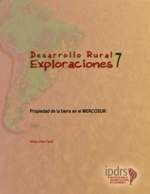La renta en la horticultura de La Plata (Buenos Aires, Argentina): causas de su heterogeneidad intra y extrarregional
El objetivo del artículo es analizar los motivos del alto monto del arrendamiento de la tierra en La Plata (Buenos Aires, Argentina), en relación con otras regiones hortícolas, a la vez de identificar las variables que hacen que dicho arrendamiento muestre importantes variaciones incluso en el interior de la capital bonaerense.





